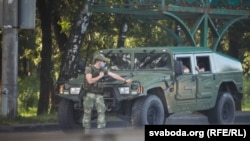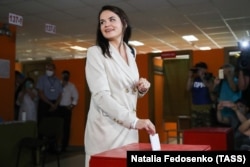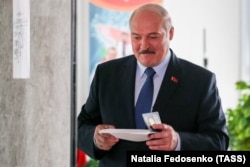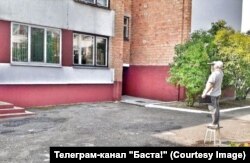As voting wrapped up in Belarus’ controversial presidential election on August 9, numerous police vans and military vehicles with armed men in fatigues took up position in the center of Belarus’ capital, Minsk. Their presence reflected how deep are the stakes in this vote over whether or not, after 26 years in power, incumbent 65-year-old President Alyaksandr Lukashenka should allow political change.
In remarks to journalists earlier in the day, President Lukashenka, who has alleged a plot by Russian mercenaries and the opposition to disrupt the elections, pledged that “Nothing will get out of control.”
“I guarantee you this. This is the main duty of the current authorities, not only the president,” the state-run news agency BelTA reported him as saying.
Lukashenka is facing four contenders in his sixth bid for election since 1994: Belarusian Social Democratic Party head Syarhey Cherachan; civil rights activist Andrey Dzmitryeu; lawyer Hanna Kanapatskaya, and homemaker Svyatlana Tsikhanouskaya.
Tsikhanouskaya, 37, the wife of popular jailed vlogger Syarhey Tsikhanouski, largely has been seen as the president’s chief rival, attracting crowds in the tens of thousands to her Minsk rallies. She has pledged fresh presidential elections within six months if elected to replace Lukashenka.
“I very much want the elections to be fair because if the government has no reason to be afraid, if all the people are for Alyaksandr Lukashenka, then we will agree with this, if the elections are fair,” she commented to TUT.by after voting in Minsk.
By 6 p.m. on August 9, 79 percent of Belarus’ 6.87 million registered voters had allegedly cast their ballots. That number, if accurate, gives election officials the quorum needed to declare the vote valid.
The long lines still outside some polling stations by evening, however, only suggested to Central Election Commission Chairwoman Lidiya Yermoshina that “a provocation” and “sabotage” is afoot, she told the television station STV. She took aim at "the protest electorate" for supposedly not knowing how to vote efficiently.
As in past Belarusian elections, little suggests that the authorities would welcome public disputes with their findings or final results.
Traffic police checkpoints have reportedly been set up at the entrance to Minsk, while police within its bounds have begun random inspections of cars. Downtown Minsk's streets have been closed as well as its subway stations.
Yet critics of Lukashenka maintain that cause already exists for peaceful protests. Voting in Belarus on August 8 and 9 occurred amidst an ongoing shutout of independent election observers, and the detention of non-governmental journalists and supporters of Tsikhanouskaya.
On the eve of election day, one of her key allies, Veranika Tsapkala, wife of former would-be presidential candidate Valer Tsapkala, left Belarus for Russia, reportedly fearing her arrest. Her husband, an ex-ambassador to the U.S., left in late July, together with the couple’s two children, for the same reason.
A second ally, Maryya Kalesnikava, was picked up briefly by police on the evening of August 8 – apparently, “by mistake,” she said. Some Belarusians believe that Kalesnikava, blonde like Tsapkala and of a similar height, was mistaken for her associate.
Tsikhanouskaya’s campaign manager Maryya Moroz also was detained on the evening of August 8 for an "administrative violation." She has not been released.
Nonetheless, President Lukashenka, stating that Tsikhanouskaya is not his “main rival,” emphasized on August 9 that “No one has undertaken any repression in violation of the law and will not undertake it.”
“Follow the law, follow the law - and all talk about repression or something else will disappear,” he commented, after voting.
A widespread breakdown or slowdown in Internet services that hampered access to Google, YouTube, Telegram, and some VPN servers snarled both independent observers and journalists’ efforts to monitor to what extent election officials and others were, in fact, following the law.
A Struggle To Monitor The Vote
For a country that prides itself on its IT sector, the day's sporadic Internet access – attributed by one state-run telecommunications company executive to high-volume “foreign traffic" – might appear unexpected. But some independent observers believe it was deliberate.
“I can explain why the Internet is jammed,” commented independent observer Oleg Dragun. “Almost our entire network of independent observers was brought down. We were left practically without coordination.”
The number of observers allowed inside polling stations was supposed to increase from three during the August 4-August 8 early voting period to five on August 9, but no reports suggest that this increased the opportunities for non-government-affiliated observers to monitor the vote.
“Since there aren’t independent observers at the polling stations, it’s very difficult to say what in reality is going on there,” said Aleksandr Khomich, a representative of the non-governmental monitoring group Chestnye Lyudi (Honest People).
Often restricted to areas outside of polling stations, these observers have largely focused instead on counting how many apparent voters have entered polling stations since early voting began on August 4.
Hanna Suslina was one of those independent observers prevented from entering a polling station in her Minsk neighborhood to monitor early voting.
As she told Current Time correspondent Yury Baranyuk, the station’s election commission argued she had “interfered” and abused her authority by making a copy of the voting protocol at the end of the first day of voting – a standard practice for election observers.
The commission told Suslina she needed the signatures of 10 neighborhood residents to be allowed to work as an observer. But when Suslina provided those signatures, she was denied access again.
Election commissions’ rules for access can change on the hour, commented independent observer Yulia Lokotkova. Contacting the local police station or the CEC to be able to enter a polling station “works for a while, “but, then, already in the second half of the day or the next day, there’re new rules, schemes, not to let observers in.”
Lokotkova and her colleagues, though stationed only on the outside of polling stations, have noticed a marked disparity between their own calculations and the official turnout results recorded by the polling stations themselves.
Minsk’s polling station number 3, for instance, posted official turnout results that surpassed those recorded at two other polling stations combined, she said.
Such disparities only underline the need for closer scrutiny of voting procedures, noted Aleksandr Khomich, a representative of the non-governmental monitoring group Chestnye Lyudi (Honest People).
The Organization for Security and Cooperation in Europe, the usual international monitoring body for elections in the region, did not observe Belarus’ presidential vote since it had not received “a timely invitation.”
Though 149 monitors from the Commonwealth of Independent States, a grouping of nine former Soviet republics, including Belarus, have arrived, their findings usually tally with those of the host government.
“[I]t seems to me the fact that they didn’t let in OSCE observers, but, nonetheless, did let in observers from the CIS, says something,” commented Khomich.
His organization, Chestnye Lyudi, has organized an online platform for an alternative vote count. Voters post photos of their marked ballots – allowed under Belarusian law – before putting them in polling station urns.
President Lukashenka has already asked prosecutors and judges to investigate the legality of alternative vote counts.
Election officials removed all curtains from voter booths, in an apparent bid to prevent photography. CEC regulations, though, do not explicitly forbid photos of a ballot, critics note.
Despite the lack of reliable Internet access on election day, nearly 1.2 million users had registered on the Belarus2020.org site by day’s end on August 9.
Media As Monitors
While independent observers had difficulty accessing polling stations, Belarusians have regularly posted information about the vote on social media since early voting began on August 4.
A widely circulated video posted on popular vlogger NEXTA’s Telegram channel shows a woman climbing down a ladder from the second floor of the polling station number 17 in Minsk’s Sovyetski district. She carries a packet in one hand, while a policeman at the bottom steadies the ladder.
On social media, the video was largely taken as amusing proof of vote tampering – a recurring issue in Belarusian elections, according to past international observers. The Central Election Commission, however, had a more mundane explanation.
The featured woman, secretary of the polling station’s election commission, had opted to climb out of the room when a door jammed, locking her in, the CEC stated Belarusian media reported. “Some panic arose because she needs to start her duties,” it explained.
Some traditional media, though, had less cause for mirth.
Two journalists (Vladimir Romensky, Vasily Polonsky) and one camera operator (Nikolai Antipov) from the independent Russian TV channel Dozhd (Rain) were detained on August 9 for unclear reasons.
One of Tsikhanouskaya’s allies, Maryya Kalesnikova, told Dozhd that the group had been detained immediately after interviewing her on the street.
Their detentions follow the August 7 detention and deportation of Current Time journalists Iryna Romaliiska, Yury Baranyuk, and Ivan Grebenyuk for not having official accreditation. The three have been banned from entering Belarus for 10 years.
At about the same time, a local reporter for the Russian-language edition of the German broadcaster Deutsche Welle, Aleksandr Burakov, was sentenced to 10 days in jail for alleged hooliganism. Deutsche Welle has called for his immediate release.
Responding to a reporter’s question about a government crackdown on critics, Lukashenka on August 9 implied that Deutsche Welle, too, is involved in a conspiracy against him.
“It won’t work!” he exclaimed. “So, pass that on to Deutsche Welle and all of Germany.”
What Chance For Change?
Despite Lukashenka’s repeated implications that change from his rule could mean chaos, voters interviewed by Current Time during the August 4 – 9 voting period repeatedly emphasized the need for a political makeover.
Though some older voters approved of Lukashenka's emphasis on stability and watchfulness for supposed conspiracies, they tended to offer their opinions less frequently and less publicly.
By contrast, cars in Minsk sometimes drove with their windows down, playing Soviet rocker Viktor Tsoi’s seminal song Peremen, or Change, a sort of unofficial anthem for Tsikhanouskaya’s campaign and other proponents of reform.
In response, supporters who staged impromptu one-person sidewalk demonstrations cupped their hands as hearts – another Tsikhanouskaya symbol.
The campaign’s white ribbons were handed out on the streets, despite the presence of riot police who sometimes swooped down and detained demonstrators and volunteers.
The ribbons are worn around wrists to show, as one voter put it, that “I have my own opinion and I’m willing to express it”
In Russia, yelling "Shame!" and "Lukashenka, leave!", expatriate voters who had waited hours outside Belarus' Moscow embassy and St. Petersburg consulate did exactly that when the polls closed at 8 p.m.
Amidst a long line of voters in Moscow, many emphasized that the detentions and accusations that have marked this presidential campaign have only strengthened their desire for a fresh start for Belarus.
Said one young woman: “We hope that things will happen that we’ll be able to return home, and life will be cool there."
-With additional reporting from BelTA and TUT.by







